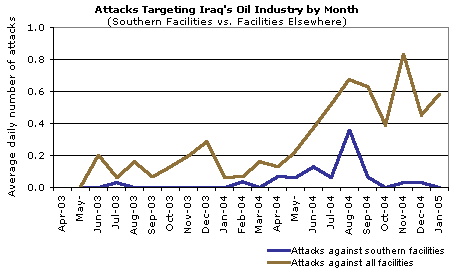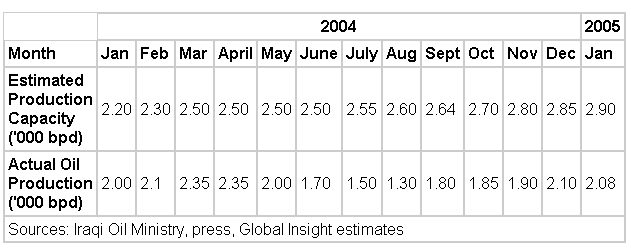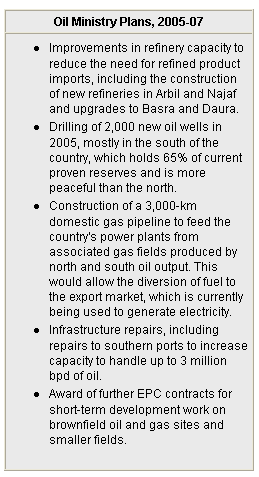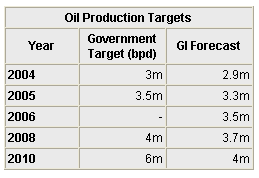After some initial success in restoring oil production capacity, sabotage and technical problems have hampered further industry development and kept production levels well below capacity in 2004. That situation is unlikely to improve dramatically over 2005, although the scenario for 2006 and beyond is somewhat brighter, if only security can be maintained and improved in key oil-producing regions.
Key Findings
Production and export figures have fallen well below technical capacity in 2004 - involving actual losses of some US$6bn and opportunity losses of up to US$15bn to the Iraqi treasury, against overall revenues of US$17bn.
The scenario is unlikely to improve dramatically over 2005. This is due to ongoing problems with security and the temporary nature of the transition government, which is likely to hold off on awarding long-term and large-scale projects until a permanent government is installed - currently timetabled for 2006.
The focus in 2005 is likely to be on limited short-term engineering, procurement and construction (EPC) contracts for oil and gas upstream work and refining projects in order to increase domestic capacity, although the results will take at least 18 months to two years to feed through.
Limited production improvements will be possible in the south of the country, with increased drilling and the ongoing upgrade of infrastructure. Northern improvements will be more ad hoc as a result of the inferior security climate, which has seen its infrastructure and production facilities bear the brunt of targeted sabotage efforts.
Political and personnel continuity will be crucial for the Oil Ministry and affiliated agencies to get on with the task of oil sector development. This means that any elected government is likely to retain key personnel after partial elections at the end of January 2005 and, most probably, after the constitutional elections at the end of 2005.
Major production-sharing contracts (PSCs) and foreign investment opportunities are unlikely to get going until 2008, as contentious previous contract awards still have to be tackled by any permanent Iraqi administration, with a view to both the legal and political repercussions of abrogating agreements, and a new regulatory environment has to be approved.
Targets of 6 million barrels per day (bpd) by the end of the decade now look well beyond range, and a figure of 4 million bpd looks more likely on the basis of work by Iraq's considerable in-house team and foreign players working on a contract basis, with only a limited contribution seen emerging from PSCs by that stage.
Limited Progress
While it is tempting to focus on the negative in looking at Iraq's hydrocarbon industry over the last year, it is clear that there have been some real breakthroughs in this sector - perhaps more here than in any other. However, the targeted sabotage and failures have undoubtedly received greater coverage, fitting well within the wider Iraqo-pessimism that has gripped Middle East watchers since the 'end' of military hostilities in mid-2003.
Among the positives has been the success of the Iraqi regime in sustaining exports, and therefore state revenues, at levels in excess of 1.55 million barrels per day (bpd) through 2004, despite a barrage of sabotage and targeted violence against key facilities. These were at their most intense during the June-September 2004 and November 2004-January 2005 periods, reflecting political tensions at the national level. This resulted in export revenues of some US$17.1bn, admittedly below targets of US$20.1bn, but still an accomplishment given the unforeseen level of instability that rocked the country. It is also a testament to the operational ability of the North and South Oil Companies (NOC and SOC) who have faced at least 200 sabotage attacks against their facilities during 2004, an increase even on the immediate post-war period when 90 attacks were registered through to December 2003.
The SOC contribution has been particularly noteworthy, increasing production and export volumes beyond those registered by the previous regime in a relatively short period of time. This has been helped by the more pacific security situation around Rumaila and other southern oil areas, particularly after the ending of the Shi'a uprising by Moqtada al-Sadr's Mehdi Army, and the subsequent fall-off in sabotage, particularly when compared with the northern areas, where oilfields, pipelines and personnel have come under sustained attack (see graph).

The rehabilitation of strategic northern and southern infrastructure has also created important export capacity gains, although these will only come into their own when stability and production volumes improve. The first of these was the inauguration of a larger parallel export pipeline to supplement the Kirkuk-Ceyhan export pipeline running from the north of the country - the only real export option for Kirkuk oil. This raised throughflows to some 500,000 to 600,000 bpd in theory, well above the older pipeline capacity of 200,000 to 300,000 bpd, which limped back onstream at the end of May 2004 after a major bombing in August 2003. Perhaps an unforeseen benefit of this has been the potential to switch pipelines in the event of an attack against one or other of the lines from Beiji, although hits further down the network and multiple strikes have meant that operations at both have been more 'off' than 'on' in the last year. Northern oil contributed a disappointing 120,000 bpd to exports on an annualised basis, compared with upwards of 700,000 bpd under the previous regime.
The reopening of Khor al-Amaya port in the south to reduce the pressure on Basra (formerly Um al-Qasr) represents another breakthrough for the post-Saddam Hussein authorities, allowing southern export capacity to rise above 2 million bpd with the expectation of increased potential in the next few months. Production and pipeline capacity may be a couple of steps behind port capacity, but any future boost to output at the Basra and Zubeir fields will now have an immediate outlet and one that has proved relatively secure, despite a number of attempted sabotage attacks. The biggest coup for port security was when a suspected al-Qaida marine attack was foiled in April 2004, although port facilities have proved more vulnerable to attacks on feeder pipelines and power supplies that lie outside the immediate 'security zone', resulting in two notable outages during 2004.
Meanwhile, perhaps the most significant plus point has been the reformation of the Oil Ministry and affiliated agencies, all of which proved relatively insulated from the Ba'athist purges that have crippled operations in other government departments. Old-time technocrats like Thamer al-Ghadhban and Dhiya al-Bakkaa have brought inside experience of the industry and personal contacts to the table, allowing the relatively rapid unrolling of a hydrocarbon development programme that draws on previous planning work and assessments. In this way the Ministry has already been able to launch the first limited contracts for evaluation work, upstream development work and refinery upgrades. This may be on a small scale, compared with the bonanza of opportunities expected by international oil companies (IOCs), but does pave the way for measured non-controversial progress, which will begin to feed through to capacity in an 18- to 36-month time-frame. This steady approach and level of in-house expertise also bode well for future oil and gas sector development, if organisational and project continuity can be maintained through the turbulent political period ahead.
Lost Opportunities
So much for the positives - what about the negatives? Well, the opportunity costs and practical costs of sabotage have been high, particularly given the sustained high world price of oil through 2004, on which Iraq was only able to capitalise in part. Yes, revenue projections did climb from US$12bn to US$20bn over the period, but in the end, just US$17.1bn was booked on some 1.9 million bpd of oil production. Potential revenues are estimated at anywhere between US$25bn and US$32.6bn at the top end of the range, which supposes production capacity of 2.9 million bpd (see table) and export prices of US$35/b - although whether world oil prices would have reached these levels without the Iraqi disruptions is a moot point.
Iraqi Oil Production

A large proportion of these 'potential' earnings was lost through the provision of 250,000 bpd to 600,000 bpd of oil to the domestic market at no charge - much of which was subsequently haemorrhaged through pipeline sabotage, technical failures and outright theft. Further losses proceeded from the frequent incapacitation of domestic pumping stations, crude pipelines and export facilities, notably in the north of the country, where the Kirkuk fields have produced under 400,000 bpd for much of the post-war period, compared to nearly twice that under the previous regime. The Oil Ministry itself calculates the direct cost of sabotage at US$8bn since the US-led invasion, or US$6bn in 2004 alone, which doesn't include the cost of providing free oil to the domestic market. Most sabotage was registered in northern areas around Beiji and Kirkuk, reflecting rising ethnic tensions and increasingly co-ordinated opposition to the government in and around the Sunni heartlands (see graph).
Indeed, the frequency and efficacy of sabotage in the north had increased to such a level by the end of 2004 that the State Oil Marketing Organization (SOMO) finally gave up its attempts to book long-term contracts for Kirkuk crude, abandoning its costly experiment in advanced sales over Q4 2004. SOMO has also quietly cut the term contract volumes from Basra and Khor al-Amaya by 10% in January (to 1.5m bpd), as a result of feeder pipeline sabotage and technical difficulties over the last two months that have raised the incidences of contract non-performance. The situation highlights the pressing need for further Iraqi export routes, particularly in the south of the country, where the proximity of Basra and Khor al-Amaya presents the risk of simultaneous outages in the event of localised power cuts, feeder pipeline sabotage and bad weather conditions.
Indeed, wider progress on rehabilitating all oil facilities has been largely disappointing in 2004, despite the award of US$2bn-worth of Restore Iraqi Oil contracts early in the year. Halliburton, Parsons Corp. and Worley Group have struggled to operate in the tense security conditions, spending up to 20% of budget on security rather than reconstruction work. The result is that even current production levels are in jeopardy because of long-term under-investment in facilities and a reliance on short-term fixes to maximise output by both the previous and current administration. The return of contractors to the southern region will be a crucial factor in whether further capacity increases are possible in 2005, but until Sunni areas in the north are pacified, the prospect of increased output from the northern oilfields looks remote.
However, any technical advances on production capacity are still expected to be tempered by the impact of ongoing sabotage and equipment failures, limiting average production in 2005 to around 2.3 million bpd, despite technical capacity of nearly 3 million bpd currently and up to 3.3 million bpd at the end of 2005 (according to Global Insight estimates) or 3.5m bpd (according to Iraqi government targets). GI expects exports to come in at an annual average of between 1.8 million and 2.1 million bpd, yielding revenues of between US$23bn and US$27bn at a prices of US$35/b, although given losses and seepage last year, the lower end of the range is more probable.
Near-Term Prospects: Planting the Seeds
So what can we look forward to in the next year, if major production increases are off the cards? The answer is, a number of beginnings that should start to bear fruit over the 18-month to two-year period and set in place the framework for future sector development, both in practical and in administrative terms.
On the administrative side, the Oil Ministry is still (at least in theory) working to mould a new national oil company (NOC) out of the various semi-independent agencies that proliferated under the previous regime, when devolution was taken to its (il)logical conclusion in the dissolution of the Oil Ministry itself. Having reformed the Oil Ministry, Thamer al-Ghadhban now seems somewhat reluctant to delegate responsibility again, holding back direct control of strategic agencies such as the State Company for Oil Projects (SCOP) and SOMO in the recent reshuffle . Where an NOC would fit into this structure isn't exactly clear and a very loose framework that works with the existing devolved structure looks like the most likely scenario at the current time. This nominal framework could then be tightened up and restructured over time, thereby minimising any near-term uncertainty and instability in the oil bureaucracy. Retention of knowledge and personnel has been a noticeable consideration for the US and interim authorities over the last two years, explaining the survival of long-term insiders led by Ghadhban, who has held key roles under Saddam Hussein, the Coalition Provisional Authority (CPA) and the Iraqi Interim Government (IIG), and may yet prevail in any future administration, given his familiarity with the planning brief.
However, practical progress on that brief is unlikely to take any major leaps forward in the next 12 to 18 months, given the budgetary constraints on spending - which has been set at US$3.75bn from 2005-07 period - as well as the outstanding regulatory and political uncertainty, which limits potential for longer-term contracts funded by debt or foreign capital.
 This means a continuation of the smaller engineering, procurement and construction (EPC) deals that have been launched since the second half of 2004. These focus on upstream development work at brownfield and smaller-scale fields, capacity improvements in the oil and natural gas networks, and, perhaps most importantly, refinery upgrades to improve production for the domestic market and help reduce the current hefty import costs of upwards of US$7m a day. The net result of these early contracts will be the addition of some 350,000 bpd of oil over a 24- to 36-month period and increased refining capacity in a 12- to 18-month timeframe, in addition to any more immediate output gains resulting from development drilling at existing fields.
This means a continuation of the smaller engineering, procurement and construction (EPC) deals that have been launched since the second half of 2004. These focus on upstream development work at brownfield and smaller-scale fields, capacity improvements in the oil and natural gas networks, and, perhaps most importantly, refinery upgrades to improve production for the domestic market and help reduce the current hefty import costs of upwards of US$7m a day. The net result of these early contracts will be the addition of some 350,000 bpd of oil over a 24- to 36-month period and increased refining capacity in a 12- to 18-month timeframe, in addition to any more immediate output gains resulting from development drilling at existing fields.
Where the Iraqi oil agencies are unable to take on work, foreign help will be sought, although bidding on these smaller contracts is expected to remain a minority interest over the next year. This reflects the limited contract scope and margins, and more pertinently, the high security and regulatory risks in the absence of a permanent recognised authority. Petrel Resources, Sinopec and Ivanhoe Energy are some of the names that come to mind in this regard, all of whom lie some way down the food chain from the heavyweights who had previously made their Iraqi ambitions known.
Where mainstream players are looking to get involved - and beginning to make some progress - is through 'hands-off' deals that minimise exposure to in-country risk while maximising familiarity with oil data and personnel. Training contracts and 'co-operation' deals were the vogue way of achieving this in 2004, a tactic followed by most of the leading oil companies and their NOC counterparts in Asia. The new fashion is to gain access to long-obscured technical data on Iraqi field capacity through field evaluation work, which will come into its own in the event of any future large-scale project awards. BP and Shell have scooped the largest reservoir assessment deals in early 2005 for the Rumaila and Kirkuk oilfields - and have been offered payment to boot. The Iraqi Oil Ministry has also been flooded with new-found friends offering to work pro bono on evaluation, including ChevronTexaco for oil and Shell (again) for gas.
2006 and Beyond: Hopes on the Horizon
It is still the expectation that those opportunities will emerge, albeit in a longer time-frame and in more difficult circumstances than originally anticipated. For Iraq to be able to recover production to 4 million bpd and upwards, IOC finance and technology is the only viable option and one that the current Oil Ministry personnel seem ready to accept. Iraq's pressing debt concerns and reconstruction needs also provide few alternatives to development led by oil revenue growth.
The planned constitutional elections at the end of 2005 therefore promise a turning point in Iraqi fortunes, both politically and economically, providing some level of regulatory certainty and decision-making authority, even if the security situation remains of concern. At that point, far-reaching decisions on the regulatory and investment framework can be taken, although given the experience of other 'newly' emergent oil states such as Libya, this may still take longer than investors would hope, as administrative incapacity and political in-fighting offer challenges along the way.
Once an overall vision and framework is set in place, the Iraqi government will then be in a position to commit to longer-term development deals, although an early challenge will be to decide the fate of the numerous oil and gas contracts agreed by the Saddam Hussein regime. While no government is likely to rubber-stamp the old agreements as they stand, given the circumstances under which those previous deals were signed, a refusal to acknowledge previous sovereign commitments - particularly those backed by powerful governments and investors, such as the LUKoil West Qurna contract - would be a foolhardy course . Informal trade-offs and initial agreements made by the previous regime will be easier for any new government to ignore, potentially freeing up more known reserves on the table for newcomers, as well as the vast expanses of unexplored acreage in the western desert and elsewhere.
 Nevertheless, the procedural delays, followed by the likely regulatory and political delays, mean that Iraq is unlikely to enter into the swing of new upstream tenders until 2008, and potentially beyond that, if the path towards security and political stability is less smooth. This holds back the potential for any substantial gains towards Iraq's long-held production target of 6m bpd into the next decade and will likely cap potential to 2010 to around the 4 million bpd mark (see table), despite Iraqi Oil Ministry hopes of meeting this level by the end of 2008. There is no question that Iraq does have the potential to reach those levels over time, given undeveloped reserves such as West Qurna, Majnoon and Nasiriya, in addition to further capacity at the existing major oilfields, all of which add up to proven reserves in the region of 115 billion barrels. But reserves don't produce themselves, and financing of some US$12.5bn to US$15bn is needed to bring even known fields onstream - an amount that even a country like Iraq will require time to locate, through international loans or foreign investment.
Nevertheless, the procedural delays, followed by the likely regulatory and political delays, mean that Iraq is unlikely to enter into the swing of new upstream tenders until 2008, and potentially beyond that, if the path towards security and political stability is less smooth. This holds back the potential for any substantial gains towards Iraq's long-held production target of 6m bpd into the next decade and will likely cap potential to 2010 to around the 4 million bpd mark (see table), despite Iraqi Oil Ministry hopes of meeting this level by the end of 2008. There is no question that Iraq does have the potential to reach those levels over time, given undeveloped reserves such as West Qurna, Majnoon and Nasiriya, in addition to further capacity at the existing major oilfields, all of which add up to proven reserves in the region of 115 billion barrels. But reserves don't produce themselves, and financing of some US$12.5bn to US$15bn is needed to bring even known fields onstream - an amount that even a country like Iraq will require time to locate, through international loans or foreign investment.
Outlook and Implications
The prevalence of sabotage, high-profile bombings and the firing of oil wells have partly obscured the advances made in ramping up Iraqi capacity after the US-led invasion, although it is clear that much of the progress was made in the first year after the invasion, followed by a series of reversals and attempts to retrench, as the security situation has unravelled.
That security situation now represents the greatest variable for developments in the hydrocarbon sector, in the form of sabotage and disruptions to oil infrastructure and, in the wider arena, through a change in the political and policy backdrop. Some reassurance of stability and measured outward-facing development is to be taken from the predominance of long-standing technocrats, rather than politicians, in the oil bureaucracy and key agencies. However, their position is likely to come under intense scrutiny in the tense political climate that will inevitably surround two scheduled elections. Once the elections are over, foreign influence will fall back and domestic attentions will turn to Iraq's future course, much of which will be determined by the availability and distribution of oil and gas revenues.
We still expect a more stable political environment to emerge from the crucible of violence and sabotage that has surrounded the run-up to these first elections at the end of January. This will likely prevail on a localised basis for most of this year, as the new government starts to consolidate its position and prepare for a more permanent system. However, until the promise of stability is at least partially fulfilled through clear-cut progress on this year's planned political timetable, mainstream oil and gas investors will be among the many watching from the sidelines.